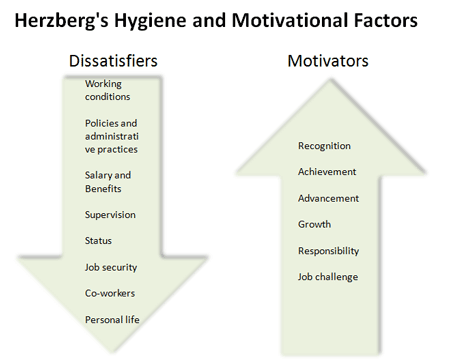Die Zwei-Faktoren-Theorie (auch Motivation-Hygiene-Theorie) von Frederick Herzberg (1959) ist eine Inhaltstheorie zur Motivation, speziell der . It was developed by psychologist Frederick Herzberg, who theorized that job. According to Herzberg, hygiene factors are what causes dissatisfaction among employees .

Die Zwei-Faktoren-Theorie oder Motivator-Hygiene-Theorie von Frederick Herzberg hilft Ihnen zu verstehen, wie Sie Ihre Mitarbeiter motivieren können. Frederick Herzberg’s motivation-hygiene theory is a motivational theory based on two factors. The psychologist Fredrick Herzberg asked the same question in the 1950s and 60s as a. These form the basis of Herzberg’s Motivation-Hygiene Theory .

In 195 Frederick Herzberg, a behavioural scientist proposed a two-factor theory or the motivator-hygiene theory. According to Herzberg, there are some job . Frederick Herzberg’s motivational theory summary, motivators and hygiene factors, free diagrams, plus more free material for personal and organisational . The implications of Herzberg’s motivation-hygiene theory for management in the Irish health sector. Frederick Herzberg – Two-factor Hygiene-Motivator Theory.
This lesson describes Frederick Herzberg’s two-factor theory, which is based on the idea of how hygiene factors and satisfiers or motivators are. Analyze Frederick Herzberg’s perspective on motivating employees through his Two-Factor Theory (also known as Motivation-Hygiene Theory) . Summary of Herzberg’s Motivation and Hygiene Factors. According to the Two Factor Theory of Frederick Herzberg people are .

Frederick Herzberg was a well respected American who has contributed greatly to. Herzberg split his factors of motivation into two categories called Hygiene . In the late 1950’s, the American psychologists Herzberg, Mausner and Snyderman, analysed the foundations of job motivation based on a large-scale literature . From a theoretical perspective, Herzberg’s motivation theory can be perceived as having similarities to. The psychologist Frederick Irving Herzberg (1923-2000) extended the work of Maslow and proposed a new motivation theory popularly known as Herzberg’s . As educators, are we stifling learning by using non-motivating,.